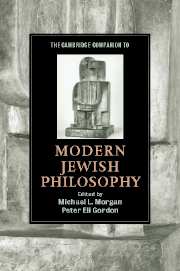Book contents
- Frontmatter
- 1 Introduction: Modern Jewish Philosophy, Modern Philosophy, and Modern Judaism
- 2 Baruch Spinoza and the Naturalization of Judaism
- 3 The Liberalism of Moses Mendelssohn
- 4 Jewish Philosophy after Kant The Legacy of Salomon Maimon
- 5 Hermann Cohen: Judaism and Critical Idealism
- 6 Self, Other, Text, God: The Dialogical Thought of Martin Buber
- 7 Franz Rosenzweig and the Philosophy of Jewish Existence
- 8 Leo Strauss and Modern Jewish Thought
- 9 Messianism and Modern Jewish Philosophy
- 10 Ethics, Authority, and Autonomy
- 11 Joseph Soloveitchik and Halakhic Man
- 12 Emmanuel Levinas: Judaism and the Primacy of the Ethical
- 13 Emil Fackenheim, the Holocaust, and Philosophy
- 14 Evil, Suffering, and the Holocaust
- 15 Revelation, Language, and Commentary: From Buber to Derrida
- 16 Feminism and Modern Jewish Philosophy
- Bibliography
- Index
7 - Franz Rosenzweig and the Philosophy of Jewish Existence
Published online by Cambridge University Press: 28 September 2007
- Frontmatter
- 1 Introduction: Modern Jewish Philosophy, Modern Philosophy, and Modern Judaism
- 2 Baruch Spinoza and the Naturalization of Judaism
- 3 The Liberalism of Moses Mendelssohn
- 4 Jewish Philosophy after Kant The Legacy of Salomon Maimon
- 5 Hermann Cohen: Judaism and Critical Idealism
- 6 Self, Other, Text, God: The Dialogical Thought of Martin Buber
- 7 Franz Rosenzweig and the Philosophy of Jewish Existence
- 8 Leo Strauss and Modern Jewish Thought
- 9 Messianism and Modern Jewish Philosophy
- 10 Ethics, Authority, and Autonomy
- 11 Joseph Soloveitchik and Halakhic Man
- 12 Emmanuel Levinas: Judaism and the Primacy of the Ethical
- 13 Emil Fackenheim, the Holocaust, and Philosophy
- 14 Evil, Suffering, and the Holocaust
- 15 Revelation, Language, and Commentary: From Buber to Derrida
- 16 Feminism and Modern Jewish Philosophy
- Bibliography
- Index
Summary
The thought of Franz Rosenzweig is arguably the twentieth century’s most enduring monument to Jewish philosophy. Yet its deeper meaning continues to elude comprehension. No doubt this is chiefly due to the difficulty of Rosenzweig’s major work, The Star of Redemption (1921). Composed in the heat of inspiration, it overflows with effulgent metaphor and sometimes extravagant claims to religious insight. More challenging still, it presumes the reader’s intimate knowledge of Judaism and Christianity, along with much of the German intellectual tradition, not to mention a basic familiarity with both Hellenistic thought and Scholasticism. In style as well as substance it is a book that forbids immediate understanding.
A more helpful place to begin is Rosenzweig’s 1925 essay, “The New Thinking: A Few Supplementary Remarks to the Star.” The essay represents Rosenzweig’s contribution to a spate of philosophical manifestos that appeared in the era of intellectual ferment during the shortlived Weimar Republic (Germany’s first experiment with democracy, lasting from 1919 to 1933). And it signals his conscious participation in a trend then called “the resurrection of metaphysics.” Specifically, it announces in programmatic fashion the various themes already familiar to a new generation tutored in Kierkegaard, Nietzsche, Dilthey, and Bergson: the primacy of poetic language, the bankruptcy of rationalist and idealist philosophy, the constitutive-existential function of temporality, the linguistic, spoken, and always intersubjective grounding of human meaning, the paradigmatic import of religious revelation, and, perhaps most of all, the turn from theoretical knowledge to “life” itself as the chief field of hermeneutic inquiry.
- Type
- Chapter
- Information
- The Cambridge Companion to Modern Jewish Philosophy , pp. 122 - 146Publisher: Cambridge University PressPrint publication year: 2007
- 3
- Cited by



